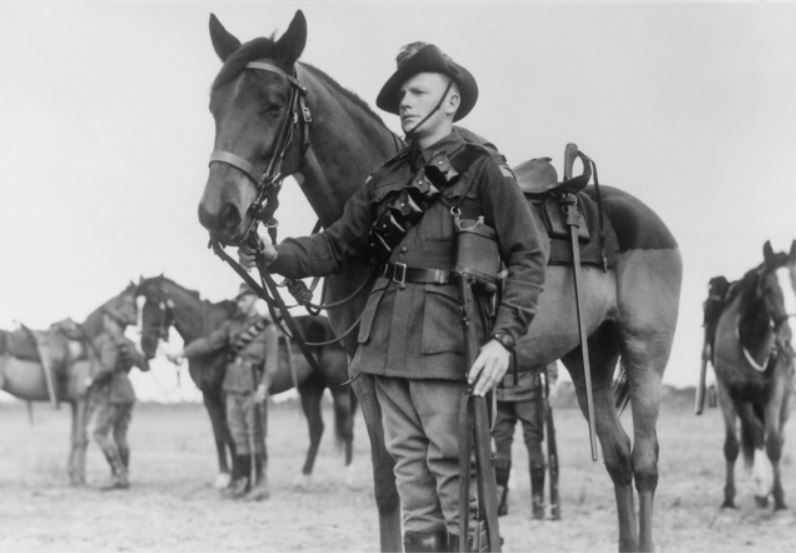Difference between revisions of "10th Australian Light Horse Regiment ww2"
From Our Contribution
(→Regimental Personnel) |
(→Regimental Personnel) |
||
| Line 27: | Line 27: | ||
* [[Desmond Cecil Challis]] 21 Oct 1941 - 10 Apr 1944 | * [[Desmond Cecil Challis]] 21 Oct 1941 - 10 Apr 1944 | ||
* [[Roy William Davey]] 5 Jan 1942 - ?? Jun 1942 | * [[Roy William Davey]] 5 Jan 1942 - ?? Jun 1942 | ||
| + | * [[William James O'Meagher]] 5 Jan 1942 - 12 May 1944 | ||
* [[Mervyn Roy Drummond]] 2 Apr 1941 - ??? | * [[Mervyn Roy Drummond]] 2 Apr 1941 - ??? | ||
* [[Mervyn Maitland]] 23 Jan - 20 Apr 1942 as [[10th Reconnaissance Battalion]] & 21 Apr - 8 Jul 1942 | * [[Mervyn Maitland]] 23 Jan - 20 Apr 1942 as [[10th Reconnaissance Battalion]] & 21 Apr - 8 Jul 1942 | ||
Revision as of 23:16, 27 November 2020
 Trooper K. Butcher with his horse in July 1943. | |
Brief History
In order to perpetuate the traditions and distinctions of the Australian Imperial Force, it was decided in July 1919 that all CMF units would be re-designated with the unit numbers of the AIF. From this date, the 25th Australian Light Horse Regiment was renamed the 10th Australian Light Horse Regiment. The regiment was called up for training in November 1939 based at Bunbury, spending a month camped just south of Woodman Point on the location of the abandoned Naval Base. They returned to Bunbury in January 1940 for another three months training before moving to Wanneroo
During the Second World War, the regiment underwent several name changes in order to show its varying roles. In January 1942 it was restructured as 10th Reconnaissance Battalion with one of the squadrons now motorised as opposed to being on horses. In 1943, it was gazetted as an Australian Imperial Force unit, after the majority of its personnel volunteered to serve overseas. This did not occur, though, and instead, its main task was the defence of south-west Australia. During this period, the regiment was also partially mechanised, although it did retain horses which were used to patrol the coastline. It was the last regiment in Australia to employ horses. It was disbanded on 14 April 1944.
Regimental Personnel
- Keith Butcher 6 Jul 1940 - ? May 1944
- Herbert Patrick Carter 21 Oct 1941 - 15 Jun 1942
- Desmond Cecil Challis 21 Oct 1941 - 10 Apr 1944
- Roy William Davey 5 Jan 1942 - ?? Jun 1942
- William James O'Meagher 5 Jan 1942 - 12 May 1944
- Mervyn Roy Drummond 2 Apr 1941 - ???
- Mervyn Maitland 23 Jan - 20 Apr 1942 as 10th Reconnaissance Battalion & 21 Apr - 8 Jul 1942
Notes
The use of ww2 at the end of the unit title is an administrative decision of the wiki to separate in the data base the WW1 unit of the same name from the WW2 unit.